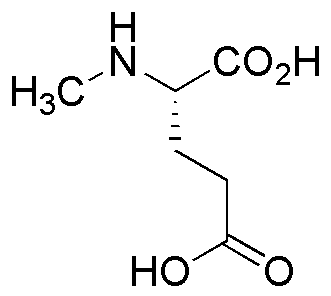N-Methyl-L-glutamic acid is widely utilized in research focused on:
- Neuroscience: This compound acts as a potent agonist for glutamate receptors, making it valuable for studying synaptic transmission and neuroplasticity. Researchers use it to explore mechanisms of learning and memory.
- Pharmaceutical Development: Its role in modulating neurotransmitter activity positions it as a candidate for developing treatments for neurological disorders such as Alzheimer's and schizophrenia.
- Biochemical Research: It serves as a useful tool in metabolic studies, helping scientists understand amino acid metabolism and its implications in various diseases.
- Food Industry: N-Methyl-L-glutamic acid can be explored as a flavor enhancer due to its umami properties, providing a natural alternative to synthetic additives.
- Plant Biology: This compound is being investigated for its potential to enhance plant growth and stress resistance, offering insights into agricultural applications and sustainable farming practices.
General Information
Properties
Safety and Regulations
Applications
N-Methyl-L-glutamic acid is widely utilized in research focused on:
- Neuroscience: This compound acts as a potent agonist for glutamate receptors, making it valuable for studying synaptic transmission and neuroplasticity. Researchers use it to explore mechanisms of learning and memory.
- Pharmaceutical Development: Its role in modulating neurotransmitter activity positions it as a candidate for developing treatments for neurological disorders such as Alzheimer's and schizophrenia.
- Biochemical Research: It serves as a useful tool in metabolic studies, helping scientists understand amino acid metabolism and its implications in various diseases.
- Food Industry: N-Methyl-L-glutamic acid can be explored as a flavor enhancer due to its umami properties, providing a natural alternative to synthetic additives.
- Plant Biology: This compound is being investigated for its potential to enhance plant growth and stress resistance, offering insights into agricultural applications and sustainable farming practices.
Documents
Safety Data Sheets (SDS)
The SDS provides comprehensive safety information on handling, storage, and disposal of the product.
Product Specification (PS)
The PS provides a comprehensive breakdown of the product’s properties, including chemical composition, physical state, purity, and storage requirements. It also details acceptable quality ranges and the product's intended applications.
Certificates of Analysis (COA)
Search for Certificates of Analysis (COA) by entering the products Lot Number. Lot and Batch Numbers can be found on a product’s label following the words ‘Lot’ or ‘Batch’.
Numéro de catalogue
Numéro de lot/série
Certificates Of Origin (COO)
This COO confirms the country where the product was manufactured, and also details the materials and components used in it and whether it is derived from natural, synthetic, or other specific sources. This certificate may be required for customs, trade, and regulatory compliance.
Numéro de catalogue
Numéro de lot/série
Safety Data Sheets (SDS)
The SDS provides comprehensive safety information on handling, storage, and disposal of the product.
DownloadProduct Specification (PS)
The PS provides a comprehensive breakdown of the product’s properties, including chemical composition, physical state, purity, and storage requirements. It also details acceptable quality ranges and the product's intended applications.
DownloadCertificates of Analysis (COA)
Search for Certificates of Analysis (COA) by entering the products Lot Number. Lot and Batch Numbers can be found on a product’s label following the words ‘Lot’ or ‘Batch’.
Numéro de catalogue
Numéro de lot/série
Certificates Of Origin (COO)
This COO confirms the country where the product was manufactured, and also details the materials and components used in it and whether it is derived from natural, synthetic, or other specific sources. This certificate may be required for customs, trade, and regulatory compliance.


